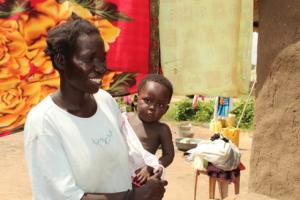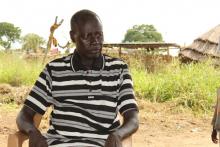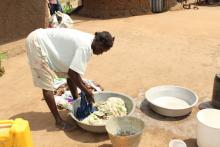Grateful to be alive after severe bout of cholera, thanks to health partner support
Celestina Poni, a 29-year-old mother of five is glad to be alive, after suffering from a severe bout of cholera which she believes almost killed her.
“I never thought I would be alive, talking and laughing like this,” Celestina Poni confesses, adding that she appreciates the support that she received from the hospital.
Celestina lives in an area called Lulubo, in Gumbo village, Juba County, in Central Equatoria State, which is among the areas affected by the current cholera outbreak in South Sudan.
Since 23 April 2014, five states comprising Central Equatoria, Eastern Equatoria, Western Equatoria, Jonglei and Upper Nile have been affected by a cholera outbreak, prompting the Ministry of Health (MoH) to declare an outbreak on 15 May. By 8 July 3,231 cases and 70 deaths had been reported with a case fatality rate (CFR) of 2.2 per cent. Juba accounts for the greatest caseload of 1,975 cases and 39 deaths representing 61 per cent of the cases and 55 per cent of the deaths reported.
Narrating her experience, Celestina says she woke up feeling fine and expecting a normal day on the morning of Monday 26 May, but at noon she developed a severe stomach ache and diarrhoea. At first she thought she had eaten rotten food and it would soon flush out of her system, but by evening, she noticed that she was passing white watery diarrhoea, had severe abdominal pains and was feeling very weak.
“I felt so weak I could not even carry my babies,” she says of her eight-month twins. Celestina’s 14-year-old daughter accompanied her to Juba Teaching Hospital (JTH) Cholera Treatment Centre (CTC) some distance from Gumbo, where she was immediately admitted, treated and subsequently discharged after five days. In addition to information on cholera prevention, she received chlorinated water to disinfect her home and clothes.
Health partners, led by WHO, are supporting the MoH in the cholera response. Through their efforts, funding has been sourced for various initiatives in the key areas of case management; surveillance; water, sanitation and hygiene (WASH) provision; and social mobilisation. National and state taskforces have also been reactivated to coordinate the response.
For case management, CTCs have been set up, while Oral Rehydration Points (ORP) have been established at community level and primary health care units in affected areas. Disinfection of patients’ households and bodies, coupled with funeral supervision, are also being conducted.
In surveillance all rumours and reports are being investigated. Data from CTCs is being analysed, including information on affected areas and risk factors, and subsequently used to inform the response.
To improve access to potable water and enhance sanitation services, activities including chlorination of trucked water, distribution provision of chlorine tablets and purification sachets to treat water at household level, provision of soap for hand washing, setting up of hand washing stations, disposal of waste and waste management in common areas such as markets are ongoing.
Social mobilization messages are being disseminated through the distribution of information, education and communication (IEC) materials on cholera prevention. Community mobilization is being conducted, using diverse approaches including public address systems, video shows, house to house visits, meetings with politicians, religious and community leaders, announcements at mosques and churches and radio talk shows.
Chief Phillip Jada Antony of Lulubo, says while Public Health and Hygiene Education (PHHE) on cholera prevention has been effective, some outstanding issues on regularising settlements need to be addressed. Community members in the former internally displaced persons (IDP) camp are reluctant to build latrines without security of tenure. He however, acknowledges the impact of cholera campaigns and notes that some people who were not affected by cholera in his area have changed their behaviour to prevent falling ill.
“I now wash my hands before eating and after using the toilet, treat water and use a latrine. All this was triggered by the cholera campaigns being conducted and the pain I saw my neighbours experience,” says Dimitri Wani, a 34 year old man from Gumbo who has so far avoided infection.
There are, however, concerns that some of the environmental factors that put the population at risk are yet to be addressed. While health partners are responding to the outbreak, Celestina – who is aware of how she got cholera - worries that continued open defecation, the absence of latrines and distribution of water treatment tablets only to recovered cholera patients continue to expose the community to cholera.
Although the number of cholera cases in Juba is decreasing, new areas are being affected, particularly Torit, in Eastern Equitoria State. While commending efforts, particularly in curbing deaths related to cholera and arresting cases in Juba, Health Minister, Dr. Riek Gai Kok, warns that partners should not relax. These sentiments are echoed by WHO Representative for South Sudan, Dr. Abdi Aden Mohamed who calls for continued vigilance and greater preparedness in high risk areas.
“The decline in cases in Juba is encouraging and so is the absence of deaths in most affected areas over the last few days. However, its emergence in new areas such as Torit is a stark reminder that the worst is not over yet and we need to remain vigilant in curbing the outbreak across the country,” Dr. Mohamed says.
While enhancing current intervention strategies in Juba County in the areas of case management, surveillance and laboratory services, social mobilization and WASH, there is also need to improve the capacity of other states to manage the outbreak. WHO and partners recommend the urgent stepping up surveillance activities at all levels; training health workers in case management and infection control; identification of key partners to set up and operate CTCs and ORPs and reviewing emergency stocks available at state level.
- "Partners have been very helpful in responding to cholera and helping members of the community to prevent the illness", Chief Philip Jada Antony.
- Fully recovered from cholera, Celestina Poni can do household chores like laundry again. She is grateful for the support partners like WHO are giving the Ministry of Health in the cholera response.
Photo: WHO/M.Moyo





